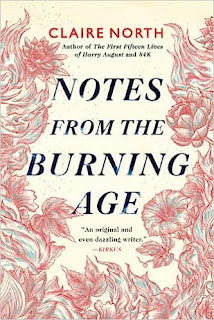July reading: Hiding from the heat
I think I'm a bit behind on my reading; if we count my Spin title, I've now read 14 books of summer and have six to go, which isn't terrible. But I'm going to need to buckle down a bit in August. And I had this month off! In August I have to go back to work! I've admittedly been rather lazy, pottering about, working on crafty projects, and watching too many YouTube videos (but stitching while I did so!). I've also done some day trips and hikes, and enjoyed air conditioning a whole lot. And I've been getting a bit involved with the local public library! How has your summer been going?
Summerbook #9: Notes From the Burning Age, by Claire North: Centuries after the apocalypse, humans live in a carefully balanced world built from the ruins of the old one. At some point during a destructive world war, chimaerical monsters -- kakuy -- arose from the depths and wreaked destruction upon humankind in revenge for their hapless destruction of the earth. Now people worship the kakuy as nature spirits and try not to re-awaken them. Priests salvage ancient hard drives and go through them, sorting between find helpful information, the random effluvia of life, and heresy -- anything that could be used to destroy. But humans are nothing if not ambitious, and some are looking for power. The kakuy haven't been seen in ages; are they even real? Why not build tanks again and start a war for domination? Our narrator, Ven, is a priest trained in ancient languages and a spy nestled in the center of the war faction and trying to track down his opposite number. It's all set in what was once Eastern Europe.
It took me forever to get into this book. Honestly, I was so bogged down! In the first half I just kept reading because it was mildly interesting and I wanted to finish it. Then I whipped through the second half in two days. I don't know if it was just me or what, but I mostly just wasn't that into this one. I found the descriptions of various factions unclear and somewhat confusing.
One thing I noticed was that in a society where everyone is poor -- or at least in Communist Yugoslavia -- things that I, a bourgeoisie, consider normal become laden with significance. Hand-me-downs or used clothing aren't an easy way to save money; they're humiliating, implying that the recipient is less than the giver. Saving yogurt containers and plastic bags for re-use isn't an eco-conscious practice; it's what your grandmother does because she's lived through much worse times. And making cloth pads isn't a slightly oddball hippie eco-mom fad; it's what you all have to do because there is no such thing as a feminine product aisle at the store, and if there was it would be empty. The lack of choice makes it all humiliating instead of simple choices.
It's a really interesting and unusual story! I'm glad it's been reprinted so I could read it. Worth seeking out if the description appeals to you.
[Emily Kemp in Korea] ...friends in China had cheerfully assured her that Chinese was understood everywhere in Korea, so she and Mary MacDougall had hired a Chinese guide, Mr. Chaio, to accompany them on their travels. It was true that in the early 20th century all Korean literati could read Chinese characters, but the travelers quickly discovered that most of the people they met on their journey were not literati. Spoken Korean and spoken Chinese are about as mutually comprehensible as English and Russian, and the hapless Mr. Chiao spent much of his time hunting for local scholars or officials with whom he could communicate through messages written on scraps of paper or scratched into the dirt of unpaved roads. His task was not helped by the fact that their itinerary through Korea had been planned on a German map that rendered some place names into Germanized approximations that were utterly impossible to correlate with Korean, Japanese, or Chinese equivalents.
A little family is on vacation at a remote cabin, and Wen is playing in the front yard. A man arrives, introduces himself and makes friends, and then says “None of what’s going to happen is your fault....Your dads won’t want to let us in, Wen. But they have to. We need your help to save the world.” He and three others are convinced that one of these people must voluntarily sacrifice themselves in order to save the whole world. This belief obviously makes no sense, and so begins a tense and violent stand-off, in which Wen's little family clings together and tries to escape, and their jailors insist that -- even though they don't want to do this -- the sacrifice must be made.




.jpg)




Pageants of Despair does sound intriguing to me! I'm going to check it out.
ReplyDeleteI think you will find it an intriguing and thoughtful story, Lory! :)
DeleteI am VERY behind on my reading, such that I wouldn't have a nice bunch of books like this to report on. All my routines have been getting overturned lately, by forces beyond my control, and it is very frustrating! :p
ReplyDeleteThe Paul Tremblay book was definitely not my cup of tea. I found it upsetting, DNFed it after maybe fifty pages or so (and reading the end), and have avoided the author ever since. I do like horror, really!, but I just like it to feel less emotionally nasty than this one did.
Yeah I probably should have gone this route! Oh well.
Delete